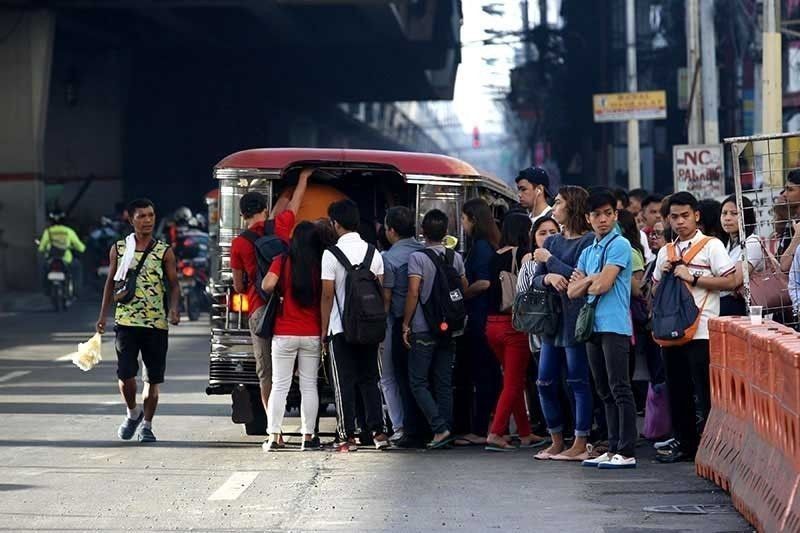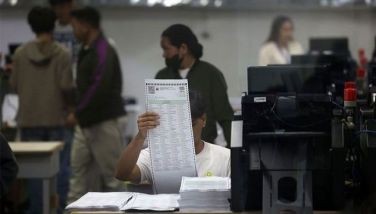Monday commute for government execs pushed

MANILA, Philippines — Inspired by the commute challenge to presidential spokesman Salvador Panelo, a lawmaker has proposed a law requiring all government officials to take public transport to work every Monday.
Iligan City Rep. Frederick Siao, chairman of House committee on civil service and professional regulation, is pushing for the passage of “Public Servants’ Commuting via Public Transport Act” that would make it mandatory for elected officials like congressmen and ranking appointive officials like Cabinet secretaries to commute every Monday.
“Every Monday, all government vehicles used to fetch and bring home public officials, from the division chiefs to Cabinet secretaries to elected public officials, would be grounded at their respective motor pools,” the lawmaker said.
“Those ranking civil servants should commute using any of the available options: tricycles, jeepneys, buses, FX/UVs, light rail, PNR trains and TNVS units. They can even use bikes. This is for Mondays only anyway,” he maintained.
Siao said government officials should follow Panelo’s example.
“We appreciate the effort and good example of presidential spokesman Salvador Panelo when he endured his 3.5-hour commute from Marikina to Malacañang. His gesture can help show to the public that the government knows the situation on the ground and that Malacañang is not an isolated seat of government,” he pointed out.
Siao also believed that such measure would help ease traffic congestion and vehicle volume on Metro Manila roads.
“That would already be thousands of government vehicles off the streets, enough to significantly decongest traffic,” he explained.
Siao said his proposal could undergo a trial run in Metro Manila and may be tried in other highly urbanized areas plagued by traffic problems.
By making officials experience inconvenience or discomfort during their daily trips to work, they would likely feel more compelled to find a solution to the traffic problem, the lawmaker said.
“There may also be a need for shorter North to South bus routes via EDSA because by the time the buses reach Makati, they are jampacked. Same with the bus and PUJ route from Fairview-Novaliches to Manila. More PUVs may be needed. Maybe a midpoint turnaround zone can be identified for the shorter bus routes,” he suggested.
Siao said Aangat Tayo party-list Rep. Neil Abayon filed a similar bill during the previous 17th Congress requiring government officials to commute to work once a month, but it was not passed.
“But my improvement on that idea is these officials should commute at least every Monday so they will be reminded weekly of the suffering the masses endure on a consistent basis,” he said.
No more challenge
Meanwhile, Panelo has made it clear he would no longer accept any challenge from detractors and leftist groups.
Panelo said he knows how commuters feel about the horrendous traffic jam in Metro Manila, contrary to how he is being portrayed by critics of the administration.
“I empathize with their everyday plight,” he said.
“I knew the traffic woes that the commuters and workers go through even before I accepted the challenge. Their creativity has managed to tide them over vis-à-vis their daily ordeal,” he added.
Panelo assured the public that the administration “is doing its best to resolve this long-standing problem that we have been facing for more than a decade.”
“Leftists and detractors are starting to forward one additional challenge after another. There is no longer any point of accepting any,” he added.
Panelo took the commute challenge last Friday, going to Marikina City and then to Malacañang by taking four jeepney rides and hitching a ride on a motorcycle.
But even after the experience, Panelo maintained that there is no mass transport crisis in Metro Manila, only traffic crisis.
“I took on the challenge to be one with our people by commuting during rush hour, sans security, media workers, photographers or a personal assistant, going to work,” he said,
Panelo said he knew “that overcoming this challenge would neither please the critics and detractors of this administration nor stop the paid trolls from bashing me and this government.”
“I accepted and took on the challenge to underscore that I understand the plight and sufferings of the Filipino commuters, whom I consider creative given the hostile situation of a Metro Manila traffic,” the Palace official said.
“They, like me, adapt to the prevailing environment and rise early to be on time in their places of work,” he said.
After assessing his one-day commute, Panelo said there may have been hardships in getting a ride, but there is no paralysis in public transport.
“This also proves my earlier thesis that there is no mass transportation crisis in Metro Manila as the political opponents of President Duterte portrayed the situation to be,” he said.
“The issue boils down to how one defines a mass transportation crisis. I have considered the term to mean transportation paralysis, that is, no available means of transport in order for one to reach his or her destination,” he added.
In reality, Panelo said one can certainly reach point B destination from point A.
“Accordingly, mass transportation in Metro Manila is not paralyzed. My stance on the aforesaid issue has not changed. Today’s experience even buttressed it,” Panelo said.
From Hemady in Manila, Panelo took a jeep going to Marikina at 5:15 a.m. before proceeding to Malacañang.
“I chose the circuitous route so that I may be able to assess the traffic situation in those areas. Hence, it took me almost four hours before I reached my destination,” he said.
During his long travel, Panelo said he now recognizes that “the problem, as it should be obvious by now, is with respect to the duration of one‘s travel and not in regard to the availability of our mass transportation.” -- With Christina Mendez
- Latest
- Trending
































